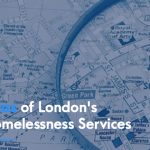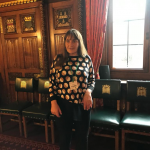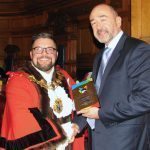House of St Barnabas wins Prestigious London Homelessness Award and £30,000
The House of St Barnabas’ Employment Academy has won the London Homelessness Awards 2016.
The Soho based project works to break the cycle of homelessness and social exclusion in London by providing homeless and ex homeless people with employability skills and support them into lasting work. The charity runs a social enterprise, a not-for-profit members’ club, in the heart of which is their Employment Academy offering accredited qualifications, on-site work experience, real job opportunities, mentoring and in to work support.
Ceri Sheppard, Employment Academy Director at the House of St Barnabas said “This is fantastic news and we are all very excited. It is a huge honour and it has already had a very positive effect on our staff and clients. We hope to spend the money training more homeless and ex homeless people to be qualified baristas.”
Laura Johnson is the Director of Housing for Kensington and Chelsea and chaired the judging panel for this year’s awards. She said: ”The judges were so impressed by the work St Barnabas do, this really is social business in action. They provide trainees with a chance to gain skills, employment experience and the opportunity to work in a commercial setting where they get to understand the value of business, shed the label of being seen as homeless and work collaboratively in a team. This is invaluable to them re-building their lives and creating opportunities for themselves. The London Homelessness Awards is really proud to award them first place.”
The guest speaker at the winners’ ceremony at City Hall today was James Murray, Deputy Mayor for Housing. He said: “Rough sleeping is one of our top priorities, it is at the very heart of the Mayor’s work in dealing with housing and homelessness.”
Second place and £15,000 was awarded to the London Borough of Croydon’s People’s Gateway and third place and £10,000 went to The Refugee Council’s Resettlement.
More details of the winning projects, and the three highly commended, are set out below:
Winner (£30,000): House of St Barnabas Employment Academy
 The House of St Barnabas is a charity pledging to break the cycle of homelessness and social exclusion in London.
The House of St Barnabas is a charity pledging to break the cycle of homelessness and social exclusion in London.
They believe that the best way to play their part in this is to provide people with employability skills and support them into lasting work.
They run a social enterprise, a not-for-profit members’ club, in the heart of which is their Employment Academy offering accredited qualifications, on-site work experience, real job opportunities, mentoring and in to work support.
The model tackles disadvantage head on, not only through the training programme but also by opening up access to social, cultural and employment networks otherwise closed to participants. They are able to step away from the labels of “homeless” and “vulnerable” to become members of a staff team.
The relationship between the club and charity is mutually beneficial; the club is a vibrant home from home for members, a community of people motivated by social change. Membership fees facilitate the work of the Employment Academy.
Participants on the 12 week Employment Programme spend 10 weeks working in the bar, kitchen, restaurant and throughout their offices, learning the skills and gaining the confidence they need not just to get a job, but to thrive. They continue to support people for 12 months (some longer), helping them to find and keep paid work and to progress.
A true social enterprise, The House of St Barnabas is on track to support their work within the Employment Academy at the House from earned income by the end of 2018.
For more information go to https://hosb.org.uk/
Second (£15,000): Croydon People’s Gateway
The People’s Gateway originated in response to welfare changes in 2013: 16,000 households were affected, with over £8m benefits lost. We needed to find a way to keep households from crisis, being forced to rely on statutory services and experiencing negative impacts on health and wellbeing.
The People’s Gateway, which is the country’s first combined council department designed to tackle housing, welfare, debt management and social care assessment, promotes independence by considering households as a whole, reducing overlap and duplication. The service prevents crises such as homelessness and stabilises struggling households. The support provided requires the customer to own and take actions to support their future position and covers financial, employment and housing support. It works with people before they get into crisis as well as with those in immediate need.
The service takes a Think Family approach looking beyond the presenting issue and assessing factors that affect families’ resilience and independence and embraces digital technology and multi-agency work.
Over the last 2 years we have helped over 1,100 of Croydon’s most severely affected families avoid homelessness; 5,400 people to become more financially independent; and over 600 residents into employment.
Third (£10,000): Refugee Council Resettlement
Refugee Housing Resettlement supports newly recognised refugees who, as a result of a being granted asylum, are homeless, not deemed as priority, and need help in securing private rented accommodation.
Our clients have often made very difficult and dangerous journeys to safety and have experienced incredible hardships: torture, persecution, and war. Many will have no social networks, have lost loved ones and feel isolated.
When refugees are granted protection by the UK Government, they are given an immediate 28 days before their asylum accommodation and support – £36 a week – is withdrawn. This is an extremely vulnerable time; many refugees find themselves homeless and financially destitute at the end of the 28 days. Language barriers and a lack of understanding of UK culture and systems make navigating the complicated London rental market in this period incredibly challenging. In addition, they will not have bank accounts, access to deposits or rent in advance.
The Refugee Council provides support and advice to refugees affected by the crucial 28 day period to search and secure tenancies within the private rental market. We provide pre-tenancy training, help in accessing rent deposits, engage and support landlords and help tackle misunderstandings about refugees’ right to rent. In 2015 we secured 42 private tenancies, and many more hostel places. This project gives refugees the tools to search for and sustain suitable tenancies so they can rebuild their lives in safety and dignity.
Commended Projects
St Mungo’s Children and Family Service
Homelessness has a detrimental effect on family relationships. Homeless or ex homeless people are often estranged from families. Traditionally, homeless services have not offered specific support.
This unmet need was highlighted in St Mungo’s research, Rebuilding Shattered Lives (2014), which looked at how women experience homelessness differently. As a result, we created the Child and Family Support Service, the first that we are aware of in the homelessness sector to respond to the needs of homeless parents.
The service offers
• advice on individual cases
• McKenzie Friends: recruiting and training volunteers to support parents who attend court without legal representation,
• Parent academy: training for parents on issues they have identified, and
• Training for staff members to help them in supporting clients who have children.
The service is not tied to one project, one type of service or one area: the C&F Support Service works with staff members in our projects across London.
Bench Outreach
Housing First works with homeless people in South East London. Traditionally, treatment for drug, alcohol or mental health issues is required before allowing homeless people to have independent accommodation. This does not work for everyone and many individuals are condemned to a cycle of homelessness – prison, hostels and rough sleeping. Housing First addresses this problem. To date, 17 tenancies have been created and sustained, and we are on target to house 60 people by the end of 2017.
Our service is unique, utilising social housing, for greater security of tenure. Housing is not contingent on entering treatment; the only conditions being a wish to live independently and a willingness to let us help maintain their tenancy.
Being housed opens doors to education and employment, improves health and promotes inclusion. Housing First heals wounds. Our clients are reuniting with family and the community. We help people to live with dignity.
Vital Regeneration
Vital Regeneration’s HELP Employment intensively supports unemployed people living in temporary accommodation in Westminster into employment, training or work experience. Since 2006, HELP has supported over 1100 individuals. On average, 25% of HELP clients move into work each year, 20% volunteer and 40% go into further training.
It also supports those facing the problem of in-work poverty to make the transition from low paid work to more fulfilling, better paid employment. HELP has the follow on HELP In-work Progression Service to enable people from the same housing background in low paid work flourish by achieving better pay and improved working conditions.
The HELP programme expanded in 2013 to include HELP Enterprise, a self-employment service aimed at supporting individuals in temporary accommodation to start up their own business. It offers business advice, workshops, sector specific training, mentoring, access to finance and affordable housing, intensive business support and Vital Invest, a micro investment vehicle.





